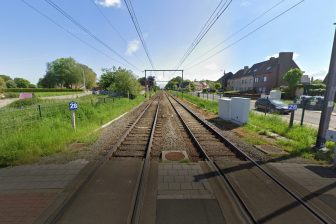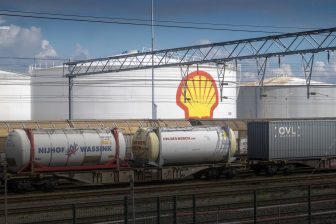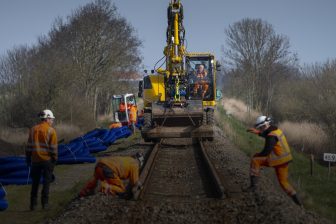4th New Opera Stakeholders Conference great success
Brussels, Belgium – The 4th New Opera Stakeholders conference gathered more than 220 participants interested in the theme: "The market opening and the perspective of increasing rail market share in a rail freight dedicated lines concept”. One year after the full market opening for freight traffic, the conference was an ideal opportunity to evaluate the progress made and to assess ideas of further necessary actions. The conference was organised by UNIFE with the support of CER, EIM, ERFA, ERFCP, F&L, UIP and UIRR.
The conference was officially opened by Georg Jarzembowski, Member of the European Parliament. He mentioned in his introduction the successful legislative actions taken by the European Commission. He appreciated the Commission’s communication on a freight oriented network and underlined that it is now of great importance to apply concrete actions. His statements gave the ground for Dr. Enrico Grillo-Pasquarelli, Director of DG TREN, who confirmed that the communication will be followed up by a set of technical, political and financial measures which have to be developed in agreement with the member states. Both representatives from the European constitutions expressed their strong interest regarding the NewOpera results and their use in European legislation.
As the conference aimed to emphasize the commercial and marketing aspect that the progressive introduction of the rail freight dedicated lines would require, it was organised in four panel discussions:
1. Modern rail market needs – intermodality and conventional traffic
2. How to increase market share in a rail freight dedicated lines concept
3. Eliminating barriers for market opening & infrastructure charging systems
4. New actors in rail freight services: freight integrators – optimizers – consolidators – logistics operators – forwarders – Ports & logistics Platforms
The market players stated concrete examples of what has been achieved and showed their optimism that rail freight is facing a successful future. On the other hand they also addressed what is still missing in the rail freight business.
The first panel showed that rail is indeed an alternative to road for logistics operators, especially in countries where liberalisation and market opening has already taken place. All speakers unanimously agreed that additional infrastructure is needed even if track capacity also can be improved by optimised operational measures, in particular on cross border relations and by better allocation of infrastructure capacity.
After this discussion Franco Castagnetti, the project coordinator of New Opera, gave a keynote speech summarising the results of the New Opera project achieved so far in the different work packages. He invited the audience to join the final New Opera conference in July where all achievements will be presented to the public.
The second panel tackled the question of how rail freight can cope with the predicted growth of freight demand in the next years against a lack of infrastructure. The freight dedicated line concept means – for all stakeholders – finding a solution to overcome the conflict of passenger and freight traffic using the same track. This situation hampers high levels of service (e.g. reliability, predictability) and hinders it from being competitive against road. More key issues discussed in the panel were interoperability of rolling stock, the use of longer trains, open access to the network, improved cooperation with infrastructure managers and the political will of member states to invest in rail freight. Mr. Ludewig, CER Executive Director, clearly stated that rail freight needs concrete and quick decisions in the member states; otherwise it will never be able to cope with the increasing transport demand: “We need a coordinated behaviour of investments on a regional or on corridor level; we have a European problem but national competences”.
In panel 3 the market players discussed barriers to improve rail freight. One problem mentioned is that undertakings cannot rely on a stable framework to plan long-term investments. All speakers agreed that a freight masterplan for Europe is needed to achieve the same level playing field in all member states. Investments in infrastructure, the harmonisation of interfaces and fair access to track and terminals are the main current market barriers. In the member states which implemented these conditions, the railway services have indeed made huge progress and rail freight became a very profitable business. However in the end the players recognised that – besides the external framework – the mentality within the sector must be modernised: “we often just run trains instead of providing logistics services” one of the panel members remarked.
The last panel presented new market players in the railway business. New logistics service providers (LSPs) are facilitators to offer a qualitative and efficient service. These LSPs consider rail, especially in the intermodal sector, as a very competitive mode of transport. Unfortunately the single wagon business is still in the hand of incumbent railways and therefore rarely accessible for new actors. The port of Hamburg stated that railways became an excellent partner to handle its growing container traffic. To offer profitable transport in the future, mixed trains (i.e. conventional and intermodal on one train) is of importance; to handle these trains LSPs started to invest in regional rail ports. Spain is heading forward with its proposal to implement a prioritised freight network. The country has new capacity for freight which will be released by the newly built high speed network.
The conclusion of the conference was drawn by Franco Castagnetti. He felt very pleased about the very positive mood between the stakeholders. He expressed his optimism that despite the complexity of the rail freight system the conference showed a collection of positive examples and activities: “We have to look at the future which offers indeed a great potential and chances for a huge business”.
U las zojuist één van de gratis premium artikelen
Onbeperkt lezen? Profiteer nu van de introductieaanbieding voor € 10,- per maand.
Bent u al abonnee?



